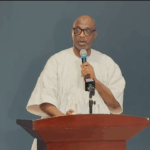The nation finds itself at a pivotal juncture with barely six days to the 2023 Mid-Year Budget Review presentation by Finance Minister Ken Ofori Atta.
With inflation up the roof, a flurry of agitations, and concerns from various fronts, the Finance Minister’s address is expected to bring some form of hope to the ordinary Ghanaian.
However, many are filled with despair instead of hope.
Already, a survey by accounting and auditing firm, Deloitte Ghana, revealed that only 11% of Ghanaian workers are optimistic about the budget impacting positively on the country’s economic growth.
The budget presentation, therefore an opportune moment for the government to present its strategy for navigating the country’s economic challenges and shaping its financial trajectory for the rest of the year.
Monday, July 31, will also be the first time the sector minister will be addressing Parliament after receiving the first tranche of the International Monetary Fund’s (IMF) $3 billion bailout, for the country.
Speaking exclusively, to The Ghana Report, some revered economists shared their general expectations and what key areas they believe the budget should address.
The general call is for the government to find a delicate balance between revenue growth and expenditure control.
The article will also explore the key areas where citizens want prudent economic measures to foster inclusive growth and social development.
Revenue Growth and Expenditure Control
An Economist and Professor at the Institute of Statistical, Social and Economic Research (ISSER), Professor Peter Quartey, underscores the critical issue of revenue mobilization and expenditure control, which has created a significant gap that requires immediate attention.
He raises questions about the effectiveness of the three new taxes recently introduced and their contribution to filling the revenue-expenditure gap.
“With the three new taxes, how well are they doing? How much revenue are they raking in? And to what extent will they fill the gap? Then also, in terms of expenditure, we saw the ministry introduce a number of measures to fill the gap aimed at curbing government expenditure. If it is not working, we need to re-strategize,” he quizzed.
Professor Quartey calls for a thorough evaluation of the revenue generated by these taxes to gauge their efficacy in curbing the fiscal deficit.
The Economist acknowledges the efforts made by the Ghana Revenue Authority (GRA) in enhancing tax efficiency. With the takeover of property rate collection and the introduction of several platforms, Professor Quartey stresses the need to assess the impact of these measures on increasing the revenue-to-GDP ratio.
Adding his voice, Economist and Research Lead at GCB Capital Limited, Dr. Courage Boti insists the success of the fiscal consolidation agenda for 2023 hinges on achieving greater revenue growth.
He points out that the three new taxes are testaments to the government’s commitment to boosting revenue.
However, he cautions against rushing into further revenue increases, considering the prevailing economic hardships faced by citizens.
On the expenditure side, Dr. Boti advocates for budget streamlining and reevaluating expenditure systems to cut away unnecessary costs. He stressed continuing and completing existing projects rather than funding new projects.
He acknowledges that such measures have been discussed in the past but emphasizes that they must gain traction, especially under the guidance of the International Monetary Fund (IMF) program.
The Road Ahead: Fiscal Targets and YouStart Project
Regarding the fiscal deficit, Dr. Boti anticipates some adjustments for the year.
He points out that the initial deficit of over 60 billion needs careful management, especially with 51 billion allocated to interest payments alone.
While the external debt exchange remains pending, he believes the interest rate savings on the local side will contribute to reducing the deficit target, provided the savings are used to clear arrears effectively.
On the subject of the YouStart project, Dr. Boti suggests renewed focus and resource allocation to stimulate growth and job creation.
Despite the constraints posed by the Domestic Debt Exchange Programme, he sees the potential for unlocking resources from the e-levy and collaborating with banks to support the initiative.
Monetary Measures and Economic Diversification
Professor Quartey raises concerns about the persistently high inflation rate, interest rates, and the stability of the exchange rate.
He urges the government to implement new measures to address these issues and foster economic stability.
Additionally, Dr Quartey emphasizes the importance of supporting the real sector, particularly agriculture, and manufacturing, to promote economic growth and reduce dependency on primary products.
Looking ahead to the second half of the year, Dr. Boti also recommends anchoring inflation down, as the current levels are already quite high. As it stands now, inflation is 42.5%.
The increase can be attributed to high food prices, with food inflation surpassing the national average at 54.2%. Imported products also experienced a significant price increase of 43.8%, while locally produced items saw a comparatively lower rise of 36.2%.
He advises against further increases in the policy rate on the monetary side, suggesting that the rate should remain stable until inflation shows signs of decline. Only then, he says, should monetary policy be directed toward stimulating growth.
No Need For New Taxes
When it comes to new taxes, Dr. Boti acknowledges the IMF’s expectations for revenue increases.
However, he emphasizes the need for prudence, especially given the challenges posed by slowing growth and economic hardships. He says it will be insensitive to impose new taxes.
Addressing concerns about new taxes, Professor Quartey advocates for the optimization of the efficiency of existing taxes rather than introducing new ones.
He insists that increasing domestic revenue will lead to a reduced reliance on borrowing.
Calls To Scrap COVID-19 Levy
Recently, there have been calls for the government to scrap the COVID-19 levy to ease the tax burden on citizens.
The COVID-19 health recovery levy is a special levy on the supply of goods and services and imports to raise the needed revenue to mainly support COVID-19 expenditures.
The levy was introduced sometime in 2021 through an ACT of parliament and was applicable to both Standard Rate and Value Added Tax (VAT) Flat Rate registered persons.
While Dr Boti sees the logic behind the call for the removal COVID levy, he doubts its feasibility given the government’s reliance on existing tax revenue sources.
He urges the government to carefully study the economic landscape before implementing new taxes, to strike a balance between revenue growth and the well-being of citizens and businesses in these challenging times.
Reduce Utility Tariffs
Many are calling for a reduction in utility tariffs. The Public Utilities Regulatory Commission (PURC) increased the average end-user tariff for electricity by 18.36% for all customer groups, effective June 1, this year.
PURC explained that the decision to increase utility tariffs had been necessitated by the price of natural gas, exchange rate, hydrothermal mix, and inflation.
But the Ghana Hotels Association is calling on the government to address the numerous charges imposed on the sector in the Mid-Year Budget.
Doing this, the association believes will allow the industry to meet its target of attracting over 1.5 million tourists.
Adding its voice, the Association of Ghana Industries (AGI) appealed to the government to reduce the utility tariffs for manufacturing companies and industries producing and contributing to the development of the country.
AGI explained that Ghana was one of the few nations in the world where industry paid more in electricity costs than home enterprises.
They pointed out that taxes and power accounted for 30% of production expenses, making it difficult for manufacturing firms to prosper and compete globally.
Address Structural Rigidities
The President of the Association of Ghana Industries, (AGI) Dr. Humphrey Ayim-Darke indicated that Ghana’s 17th IMF program has helped reduce the negative impact of the country’s macroeconomic condition on businesses but urges the government to do more to support entrepreneurs.
Dr. Ayim-Darke argued that government still needs to address some structural rigidities to help businesses navigate the difficult macroeconomic conditions.
He mentioned that the country’s current macroeconomic conditions have negatively affected businesses and have placed a hold on growth and job creation while paving the way for the importation of finished goods into the country.
According to him, this singular act has reduced production by many businesses in the country and these are critical issues that government must tackle in the mid-year budget.
Withstanding External Shocks
Professor Quartey highlights the potential threats posed by external shocks, citing the recent tensions between Russia and Ukraine as an example.
With potential disruptions in grain supplies affecting food prices, he urges Ghana to focus on enhancing agriculture and value addition to reduce vulnerability to global economic shocks.
“The only way we can withstand economic shocks is through diversification and adding value so we don’t rely on primary products alone. We need to add value but if we continue to rely on raw materials, in their raw form, any shock on the global economy is likely to hit us,” he explained.
Overall, Professor Quartey calls for a comprehensive and strategic approach to revenue mobilization, expenditure control, and economic diversification.
While praising the government’s efforts to stabilize the economy, he emphasizes the need to continue prioritizing sectors that drive sustainable growth and mitigate external risks.
















